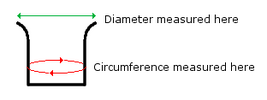Jerusalem Blade
Puritan Board Professor
I noted in a discussion earlier this year the matter of the value of pi in the Bible was brought up, and these are some thoughts on that.
Contrary to some who say the Bible erroneously gives the value of pi as 3.0, using 1 Kings 7:23 (Cf. 2 Chronicles 4:2) as alleged proof, as it says that the large basin for the ceremonial washing of the priests was 10 cubits across (180 inches), 30 cubits in circumference (540 inches), and was round. Upon first glance it does appear as though the ratio between the diameter and the circumference is said to be 3.0 instead of pi. The circumference of a circle is pi x D (3.14159 times the diameter), so it would be impossible for a round vessel to have a diameter of ten and a circumference of thirty.
However, the Scripture a few lines down, in verse 26, adds an important detail: “and it [the wall of the basin] was an hand breadth thick” (4 inches). Evidently the circumference was measured around the inside of the basin, while the diameter was measured from the outside perimeter, for if one subtracts the extra 8 inches for the thickness of the walls and measures the diameter from inside wall to inside wall the distance would be 172 inches, which multiplied by pi (3.14) would equal 540.08, which is quite accurate.
I got this solution from Harold Lindsell in his book, The Battle for the Bible, pp. 165-166. There are a number of apparent discrepancies in the Book of God, but upon close examination they can be solved, for God’s Scripture is without error throughout, and can be defended as the truth.
Contrary to some who say the Bible erroneously gives the value of pi as 3.0, using 1 Kings 7:23 (Cf. 2 Chronicles 4:2) as alleged proof, as it says that the large basin for the ceremonial washing of the priests was 10 cubits across (180 inches), 30 cubits in circumference (540 inches), and was round. Upon first glance it does appear as though the ratio between the diameter and the circumference is said to be 3.0 instead of pi. The circumference of a circle is pi x D (3.14159 times the diameter), so it would be impossible for a round vessel to have a diameter of ten and a circumference of thirty.
However, the Scripture a few lines down, in verse 26, adds an important detail: “and it [the wall of the basin] was an hand breadth thick” (4 inches). Evidently the circumference was measured around the inside of the basin, while the diameter was measured from the outside perimeter, for if one subtracts the extra 8 inches for the thickness of the walls and measures the diameter from inside wall to inside wall the distance would be 172 inches, which multiplied by pi (3.14) would equal 540.08, which is quite accurate.
I got this solution from Harold Lindsell in his book, The Battle for the Bible, pp. 165-166. There are a number of apparent discrepancies in the Book of God, but upon close examination they can be solved, for God’s Scripture is without error throughout, and can be defended as the truth.


